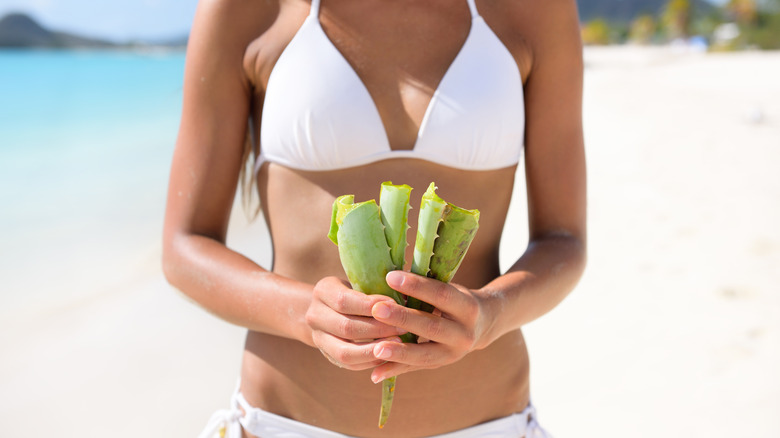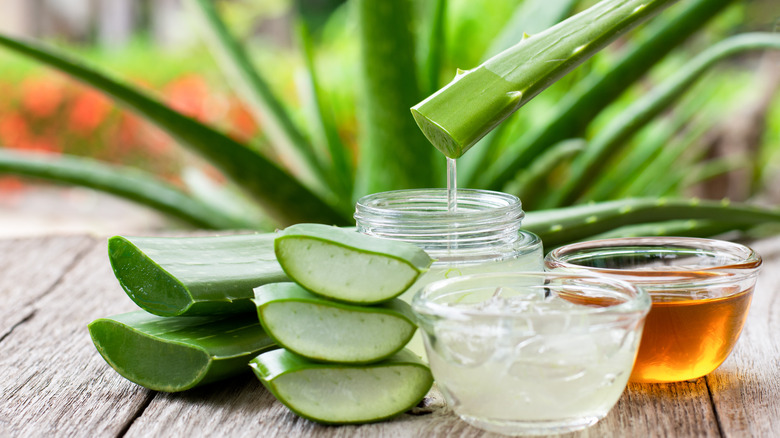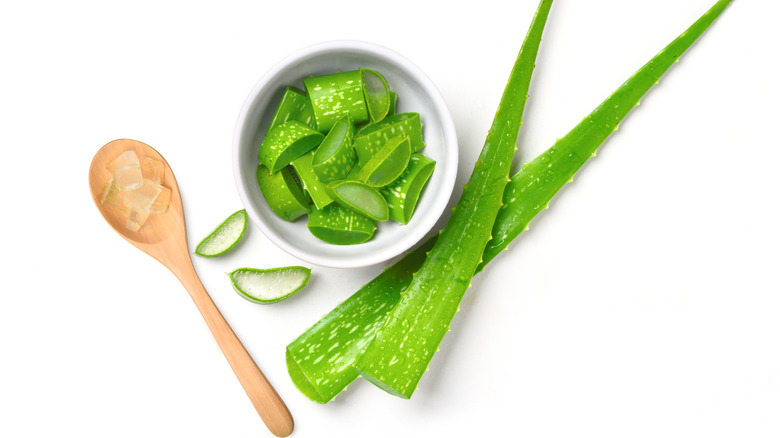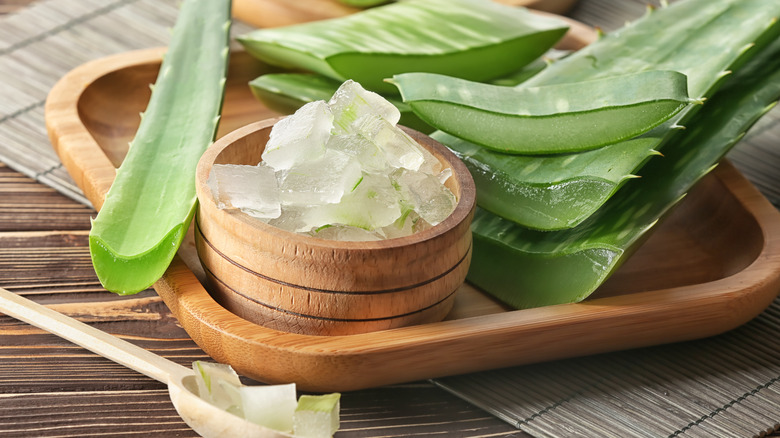The Best Thing To Put On Your Sunburn
Now that summer's here, the rush to get outside and bask in the sun at the first opportunity is totally understandable. You may even be tempted to relax and doze off while catching rays, putting you at risk of waking up with a painful sunburn.
Of course, your skin doesn't care how badly you crave sunshine. It will protest against the onslaught of UV rays just the same. Although getting some sunshine is great for boosting vitamin D levels (along with our spirits), too much of it just isn't good for our skin. Overexposure to the sun can lead to sun poisoning (per Insider). Plus repeated offenses increase the effects of aging and the odds of skin cancer. Thankfully, there are some great over-the-counter products to help with healing after a sunburn. At the top of the list is the favorite sunburn soother, aloe vera.
Dr. Joel Schlessinger, an Omaha-based dermatologist, explains, "Its stems store water, creating a clear, gel-like substance that contains vitamins, antioxidants, minerals, and amino acids" (via Good Housekeeping). In fact, some of the vitamins found in aloe vera include vitamins A, C, and E which fight free radicals from sun damage (per Insider).
Why aloe vera works
You may be wondering why aloe vera is so effective. Known as the "burn plant," aloe vera offers a holistic approach to treating various skin conditions (via Healthline). Most of its healing properties come from the thick, sticky, clear substance found within the leaves, containing the compound aloin. One 2018 study found aloin is an effective anti-inflammatory compound, though it's unclear why this is true.
According to a 2019 study in the Iranian Journal of Medical Sciences, not only is the plant anti-inflammatory, but it's also anti-bacterial, antiseptic, and supports wound healing. Researchers also indicated that aloe vera improves wound recovery, the integrity of the skin, and moisture retention.
When it comes to supporting skin health, aloe stimulates the production of collagen and can help neutralize free radicals within the body caused by overexposure to the sun, Insider reports. So what's the best way to source your aloe vera?
Get aloe straight from the plant
Did you know you can actually source aloe vera straight from the plant? If you go this route (instead of purchasing it in a bottle) you'll want to cut the leaves open, then squeeze the liquid gel out, dermatologist Marie Hayag tells Insider. Once you've extracted the gel, gently rub it directly onto the sunburned area.
But before slathering it on, Hayag recommends taking a cool shower and storing the plant in the fridge which can add an extra soothing effect to burned skin (via Insider). Hayag tells Insider it's important to be mindful that "aloe vera does contain natural enzymes, which can have a mild exfoliating effect on the skin over time, so be sure not to overapply."
While aloe vera is generally considered safe to use, Medical News Today also suggests testing it on a small part of your body, then waiting for up to 24 hours to see if an adverse reaction occurs. If you experience skin irritation, you may want to speak with your doctor about alternate solutions for relief.
Aloe gel and lotion work great too
Of course, not everyone has an aloe vera plant lying around. So you may opt for a popular store-bought aloe vera product, including a cream, mist, gel, or lotion (via Eating Well). While they all may be effective in treating sunburns, they all have different strengths.
For instance, aloe vera creams tend to be the thickest in consistency. They're mainly used by those with underlying skin conditions such as psoriasis or eczema since it's extremely hydrating (per Eating Well). On the other hand, aloe vera-infused lotions offer a lighter texture, which according to Self, are less likely to trap heat in the body. Self recommends avoiding petroleum products, like Vaseline, or other thick oil-based lotions when treating sunburns.
If you're looking for the most convenient method, aloe vera-infused sprays may be your best bet. Sprays can be directly applied onto sensitive areas without the need to rub it in (via Miami Herald).
Still, aloe vera gel remains the most popular product, perhaps due to the cooling effects it provides (via Eating Well).
What to look for when shopping for aloe
According to GoodRx Health, the U.S. Food & Drug Administration (FDA) doesn't regulate aloe vera products or test their safety because they are considered cosmetics. No matter what you choose — gel, cream, mist, or lotions — you'll want to follow these best practices when it comes to buying aloe vera-infused products.
Strive to buy organic products that contain at least 95% pure aloe vera, as this may yield the best results (via GoodRX Health). Dermatologist, Lilliana Ramírez García, tells Eating Well, "... a small study showed that a product containing only 70% aloe vera had no benefits for sunburned skin, so sticking with the pure form is best." You'll also want to avoid artificially colored products, points out GoodRx Health.
Opt for well-reviewed brands. For those seeking a gel, Verywell Health recommends Sun Bum After Sun Cool Down Gel, which also contains tea tree oil and vitamin E to support skin health. Burt's Bees After-Sun Soother is a lotion enriched with both aloe and coconut oil to soothe and moisturize. Other popular brands include Coola, Seven Minerals, and Holika Holika (via Byrdie).
When aloe won't help you
Sometimes aloe vera just won't cut it. When this happens, it may be a sign that the burn is more severe than anticipated. According to Johns Hopkins Medicine, severe symptoms from too much sun exposure can take 24 to 36 hours to show up.
Severe symptoms include painful skin that feels hot, intense swelling, and significant blistering all over the sunburned area (per Mayo Clinic). This blistering can cover any part of the body that spent a bit too much time in the sun (arms, face, etc). Another sign of a severe sunburn is when pus starts building, open blisters form, or the sunburned area looks infected (via WebMD). If these symptoms don't improve in a few days, it's best to seek medical advice. However if your sunburn also accompanies dehydration, a fever over 103 degrees, confusion, or fainting, Mayo Clinic says to seek emergency help right away.
Even though aloe vera is helpful in wound healing, it's not magic. Prevention remains the best tactic for fighting sunburns. Put on sunblock before heading outdoors, wear protective clothing, and limit your time in the sun.






